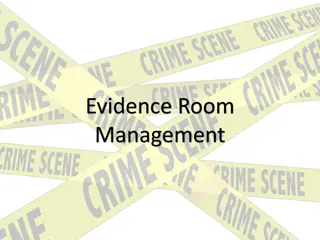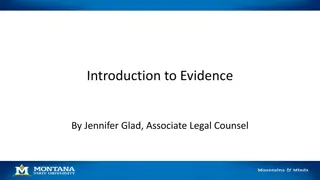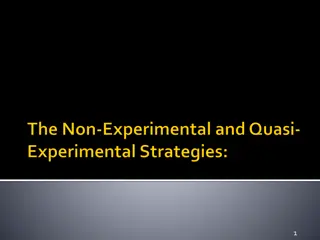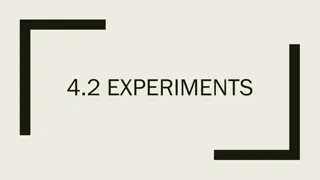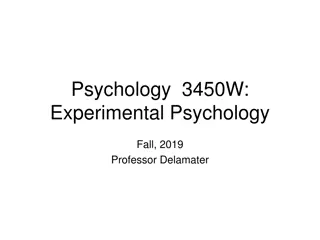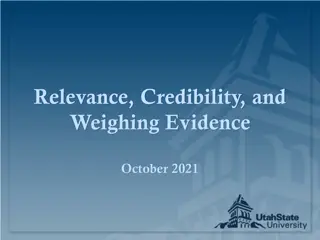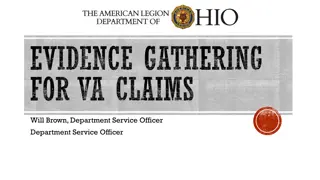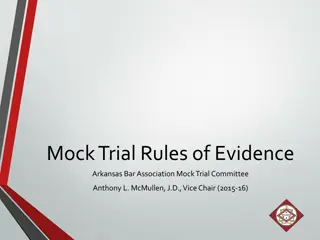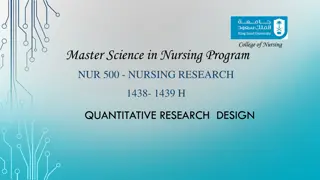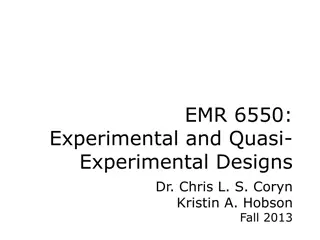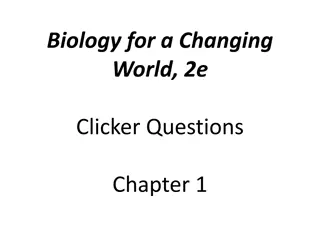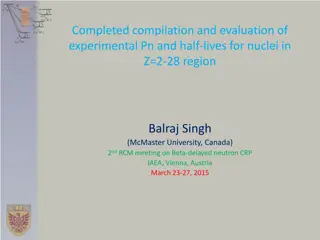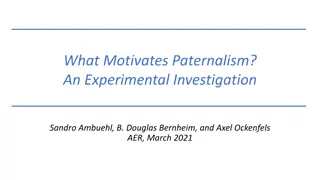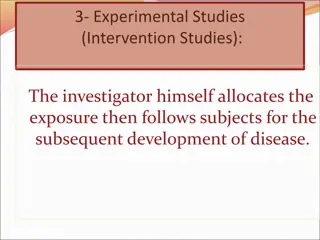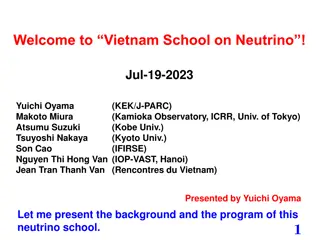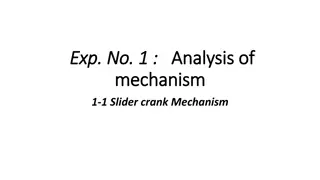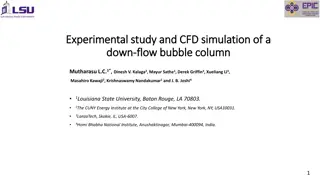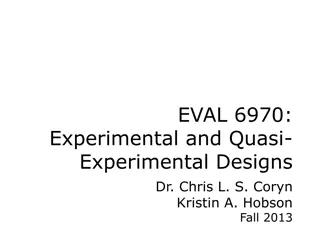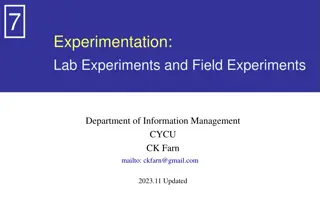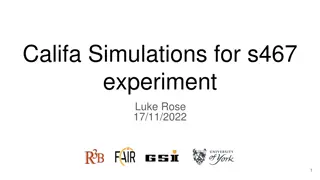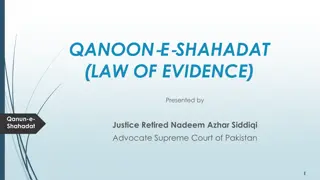Introduction to Experimental Economics by John Hey: A Comprehensive Overview
Explore the interconnected realms of Experimental Economics and Behavioral Economics through the insightful lectures of John Hey, an Emeritus Professor at the University of York. Discover the methodology of testing economic theories for validity and the practical applications of experimental economi
1 views • 58 slides
The Role of Artifacts and Evidence in Educator Evaluation and Support
Exploring the role of artifacts and evidence in educator evaluation, this content covers the three categories of evidence required by the Oregon Framework. It delves into the efficient process that reduces redundancy, essential components of SLG goals, and the types of evidence relevant to professio
0 views • 15 slides
Understanding Impression Evidence Collection in CSI Investigations
Impression evidence plays a crucial role in investigations, including shoeprints, tool marks, tire tracks, bite marks, and riffling marks on bullets. This evidence can be collected in 2D using photography or tape lifts, and in 3D through casting methods. Differentiating between class and individual
0 views • 21 slides
Helpful Information About Submitting Evidence to the Crime Lab.
Helpful information about submitting evidence to the Nebraska State Patrol Crime Lab's Evidence Section. Learn about the NSP 750 Evidence Submittal Form, submission process, and guidelines for resubmissions. Ensure all necessary details are provided for proper analysis of evidence.
5 views • 16 slides
Insights on Experimental ASF Vaccines in Pig Studies
The research conducted by Prof. Jishu Shi and his team at Kansas State University delves into the safety and efficacy testing of experimental African Swine Fever (ASF) vaccines using pigs as the model. Various vaccines, including DNA vaccines and live attenuated viruses, were tested against differen
4 views • 13 slides
Illegally obtained evidence
Illegally obtained evidence refers to evidence acquired through unlawful means, such as searches without warrants or extraction under duress. The Fruit of the Poisonous Tree doctrine renders evidence inadmissible if derived from illegally obtained evidence. The Exclusionary Rule prohibits the use of
2 views • 30 slides
Evidence Room Management
Explore the intricacies of evidence room management in a law enforcement setting, including the roles of individuals like Greg Van Buskirk, differences in crime scene management between large and small departments, the distinction between property and evidence, the importance of maintaining chain of
0 views • 8 slides
Understanding Evidence in Investigations
Learn about the principles and types of evidence in investigations, including inculpatory and exculpatory evidence, physical, documentary, demonstrative, and verbal evidence. Explore sources of evidence and the significance of collecting relevant information to ensure a fair investigative process.
0 views • 14 slides
Understanding Context Evidence in Legal Proceedings
Context evidence in legal proceedings refers to evidence of acts not charged in the indictment, used to provide a background for understanding specific allegations. This type of evidence is often relied upon by the prosecution to explain events or behaviors that may seem isolated or surprising. It i
1 views • 13 slides
Understanding Nonexperimental and Quasi-experimental Studies
Nonexperimental and quasi-experimental studies resemble experiments but lack random assignment, making them valuable for group comparisons without establishing causation. This type of research design looks at differences between groups that already exist, focusing on group differences rather than ca
1 views • 35 slides
Understanding Experiments in Research: Observation vs. Experimentation
Observation and experiments are two crucial methods in research. An observational study involves observing and measuring variables without influencing responses, while an experiment deliberately applies treatments to measure responses. Confounding variables can affect the results, and factors like e
0 views • 13 slides
Understanding Experimental Psychology: Designs and Control Issues in Research
This content delves into the basics of experimental research, focusing on different types of experimental designs and control issues. It covers between-group and within-group designs, discussing advantages and disadvantages, as well as methods for controlling for nonequivalence. The importance of ra
0 views • 26 slides
Understanding Evidence-Based Medicine and Clinical Decision-Making
European Patients Academy on Therapeutic Innovation emphasizes the importance of Evidence-Based Medicine (EBM) in providing optimum clinical care. EBM involves systematic review and utilization of clinical research for informed decision-making, benefiting patients in disease management and treatment
7 views • 20 slides
Understanding Relevance, Credibility, and Weighing Evidence in Decision-Making
Explore the importance of relevance and credibility in evidence assessment, the role of hearing panels in evaluating evidence fairly, and the responsibilities they hold. Learn about presenting relevant evidence, policy analysis, and identifying irrelevant evidence to ensure a thorough review process
6 views • 32 slides
Understanding Probability: Experimental and Theoretical Concepts
Probability is the measure of the likelihood of an event happening, with experimental and theoretical probability being key concepts. Experimental probability involves determining probabilities through experience or experiments, while theoretical probability can be calculated without prior experienc
2 views • 23 slides
Mastering Claims, Evidence, and Warrants for Persuasive Writing
Understanding the concepts of claims, evidence, and warrants is crucial for constructing persuasive arguments. Claims represent positions to persuade, evidence supports claims with facts, and warrants bridge the gap between evidence and claims. An exercise is outlined to help practice forming claims
0 views • 8 slides
Understanding Biased Assimilation and Attitude Polarization in Social Disputes
People with strong opinions on complex social issues tend to interpret evidence in a biased manner, accepting confirming evidence readily while subjecting disconfirming evidence to critical evaluation. This can lead to increased polarization rather than narrowing of disagreement when exposed to the
0 views • 20 slides
Transformation of Quality Assessment Framework in Healthcare
The healthcare quality assessment framework is evolving with a new strategy focused on data-led, people's experiences, care integration, and safety culture. The current framework is transitioning towards a new approach by late 2023, incorporating separate registration and monitoring processes, five
0 views • 14 slides
Understanding Evidence Gathering for VA Claims with The American Legion Department of Ohio
Evidence is crucial for VA claims, and it can come in various forms such as documents, written statements, photos, and video recordings. The framework for evaluating evidence includes factors like relevance, competence, credibility, and weight. Understanding the types of evidence, forms of relevance
0 views • 14 slides
Understanding Mock Trial Rules of Evidence
Mock Trial Rules of Evidence are crucial for determining the admissibility of testimony and evidence in a trial setting. Students preparing for cases need to assess evidence admissibility, make timely objections, and be prepared to defend testimony. The rules cover objections, specific objections ty
0 views • 36 slides
Quiz Review on Scientific Method and Graphing
Explore a quiz review covering topics related to scientific method, graphing, and experimental design. Understand key concepts such as hypothesis, scientific law, theory, variables, and experimental control through detailed questions and images. Test your knowledge on laboratory safety, inferences,
0 views • 14 slides
Understanding Quantitative Research Designs in Nursing
Delve into the world of quantitative research in nursing, exploring different research designs and the concept of causality. Learn about experimental, quasi-experimental, and non-experimental designs, as well as the characteristics of experimental design like manipulation, control, and randomization
0 views • 22 slides
Quasi-Experimental and Interrupted Time-Series Designs Overview
Explore the various quasi-experimental designs, control groups, pretests, and outcome patterns in research methodologies. Understand the implications of different outcome patterns on causal interpretation and validity threats in experimental studies.
0 views • 31 slides
Practice and Procedure in Judicial Review: Factual Evidence and Interveners
The content provides valuable insights into the practice and procedure regarding factual evidence and interveners in judicial review cases. It covers general rules, recent cases, applications for oral evidence, questioning witnesses, opinion evidence, and the role of interveners. Key points include
0 views • 28 slides
Understanding Experimental Design in Biology
Explore key concepts in experimental design in biology through clicker questions focusing on hypotheses, variables, control groups, and experimental groups. Learn how scientists test hypotheses and analyze results to draw valid conclusions in biological studies.
0 views • 15 slides
Compilation and Evaluation of Experimental Data for Nuclei in Z=2-28 Region
Completed compilation and evaluation of experimental Pn and half-lives for nuclei in the Z=2-28 region, led by Balraj Singh at McMaster University. The work involved preparing lists of neutron-rich nuclides, identifying potential emitters, analyzing available experimental data for 1n, 2n, 3n, and 4n
0 views • 20 slides
Advances in Ceramic Composite Property Modeling and Experimental Characterization
European research focuses on advanced modeling of C/C, C/SiC, and SiC/SiC composites for aerospace and nuclear applications, with an emphasis on correlating simulations with experimental validation. Laboratories are progressing towards a multiscale approach, integrating micro/nanomechanical characte
0 views • 5 slides
What Motivates Paternalism? An Experimental Investigation
Centuries of normative debate on paternalism have resulted in its ubiquity in various aspects of society, from consumer protection to safety regulations. However, there is a scarcity of empirical studies on the motivations behind paternalistic interventions. This experimental investigation delves in
0 views • 12 slides
Understanding Experimental Studies: Intervention, Characteristics, and Measurements
Experimental studies involve the investigator assigning exposures and following subjects to observe disease development. Different types of experimental studies exist, such as preventive and therapeutic types, each with its limitations, including ethical concerns and challenges in recruiting subject
0 views • 13 slides
Understanding Research Methods and Data Analysis
This review covers topics such as experimental classification, the comparison of non-experimental and experimental research, software features like JMP and SPSS, outlier handling in data analysis, and levels of measurement in statistical analysis.
0 views • 13 slides
Vietnam Neutrino School Overview
Vietnam School on Neutrino is an annual event started in 2017 to promote experimental neutrino physics in Vietnam. Led by Prof. Jean Tran Thanh Van, the school focuses on lectures, software and hardware training, group works, and excursions. With a mix of students from various countries, the aim is
0 views • 7 slides
Analysis of Slider-Crank Mechanism and Experimental Data
Slider-crank mechanism analysis involves understanding the transformation of input motion into desired output motion. This mechanism consists of a crank, coupler, slider, and ground link, converting circular motion into linear motion. Experimental procedures involve setting crank angles and recordin
0 views • 6 slides
Experimental Study and CFD Simulation of a Down-flow Bubble Column
This study and simulation focus on the experimental setup, measurement techniques, and results of a down-flow bubble column. It explores novel features such as inverted bubbly flow, micro-bubble generation, and gas injection. Detailed analysis includes axial and radial variations of volumetric gas h
0 views • 25 slides
Understanding Experimental and Quasi-Experimental Designs
Explore the foundations of experimental and quasi-experimental designs, delving into causal relationships, counterfactual reasoning, and the importance of validating statistical and internal conclusions. Learn about causes, effects, and the complexity of determining causation in research. Discover R
0 views • 46 slides
Understanding Probability: Learning Outcomes and Examples
This content delves into the study of probability, covering topics such as representing probabilities of simple and compound events, calculating relative frequencies, multi-step chance experiments, theoretical and experimental probabilities. It explains concepts like chance experiments, sample space
0 views • 31 slides
Understanding Experimental Studies in Epidemiology
Epidemiological studies and experimental studies play vital roles in understanding cause-and-effect relationships in research. Experimental studies involve manipulating independent variables and measuring dependent variables, with categories such as true experimental, quasi-experimental, and pre-exp
0 views • 22 slides
Understanding Experimental Design and Validity Trade-offs in Research
Explore the concepts of experimental design, trade-offs in research validity, causal relationships, evidence, and controls in experiments. Delve into lab and field experiments, manipulation of variables, controls, and the importance of causal evidence in research. Consider the impact of extraneous f
0 views • 42 slides
Califa Simulations and Experimental Observations in Nuclear Physics Research
Exploring nuclear physics research through Califa simulations and experimental observations with a focus on PID gating, clustering algorithms, beam settings, and Ca isotopes chain gating. The study involves simulating events on CH2 targets, analyzing clustering effects, and observing opening angles
0 views • 10 slides
Understanding Qanun-e-Shahadat: Law of Evidence in Pakistan
Qanun-e-Shahadat Order 1984 replaced the Evidence Act of 1872 in Pakistan, aiming to align the law of evidence with Islamic principles. This law is crucial for judicial proceedings, governing the admissibility of oral and documentary evidence, primary and secondary evidence, and resolving conflicts
0 views • 22 slides
FY25 LBS Lab OMEGA/OMEGA EP Proposed Campaign
Proposed campaign in FY25 by the LBS Lab to measure specific deliverables, compare results with experimental and theory PIs, collaborate with others, and assess technical issues such as target fabrication feasibility. The campaign involves motivation, relevant milestones, previous/simulated results,
0 views • 6 slides






